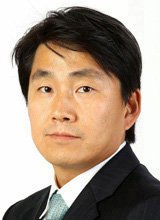What made Yeong-eun get U.S. Presidential Scholarship?
What made Yeong-eun get U.S. Presidential Scholarship?
Posted May. 30, 2020 08:25,
Updated May. 30, 2020 08:25

Enormous cheers have been coming from South Korea, the home country of Lee Yeong-eun, a visually impaired high school senior at Northern Valley Regional High School in Demarest who became one of the awardees of the 2020 U.S. Presidential Scholarship. It is nothing new that a handful of cynics belittle her winning of the prestigious scholarship by cynically guessing that it is attributable merely to her brilliance in the DNA. “That is exactly how I used to respond to others’ success stories. However, my experience taught me that I was wrong,” Lee said.
Lee Yeong-eun was born with Leber congenital amaurosis, a rare inherited eye disorder, in Jinju, South Gyeongsang Province, in 2001. She developed unstable wandering eyes just around 100 days after she was born. Her parents noticed that something was wrong with their daughter. They recalled how much their hearts were broken when the doctor said that Yeong-eun could get blind. Her family flew to the United States to better help the little girl receive treatment and education when she reached school age.
Yeong-eun suffers from narrow and blurry vision as if she were in the dark tunnel, disabling her to see things well. She is not able to run, write and read by herself. However, she would relieve her stress and feel better when running with the help of her father who held her hands. Transferring to an elementary school in Virginia in 2009, she joined a running club. At first, she was afraid of running with new people, which later taught her how to have faith in friends.
Yeong-eun was honorably named salutatorian of her graduating class at high school although she had to depend solely on braille and audiobooks. She commented on the contributions made by a braille teacher, who was hired by her school to change learning materials such as graphs into braille and send them back to her. New Jersey State provides students with visual impairments with computers equipped with a braille-enabled keyboard.
Maggie, a guide dog, became Yeong-eun’s lifelong companion with the help of a non-profit organization in 2017. It takes as much as 50,000 U.S. dollars to get a guide dog trained. The non-profit group in question sponsors visually impaired students by raising funds from U.S. citizens.
Appreciating Yeong-eun’s academic achievements and extracurricular activities, the White House did not hesitate to award an immigrant student the 2020 U.S. Presidential Scholarship, one of the most prestigious scholarship programs in the United States that humbles only 0.004 percent or 161 out of around 3.6 million high school seniors.
Yeong-eun goes to Princeton University in September. She dreams of working in the Washington political scene as she believes in the role of politics in making the world a better place. The self-nicknamed “political nerd” thinks that everyone has their own difficulties to struggle with – physically, mentally, language-wise and so on. She hopes to bridge people with the government so that they can stand back on their feet.
Through her grit and support from her family, Yeong-eun was able to stand on her feet. What has enabled her to run forward may be neighbors, schools, civic groups and government systems across the United States that care for and give opportunities to those with disabilities. Such distinguished talents who belong to 0.004 percent of the entire country do not appear overnight but feed on social assistance and capital. Hopefully, South Korea will see more people just like Yeong-eun stand up and start off running despite any disabilities.
Yong Park parky@donga.com







